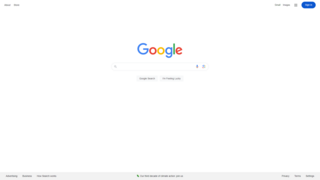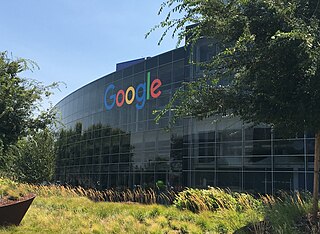
Google Search is a search engine provided and operated by Google. Handling more than 3.5 billion searches per day, it has a 92% share of the global search engine market. It is the most-visited website in the world. Additionally, it is the most searched and used search engine in the entire world.
Meta elements are tags used in HTML and XHTML documents to provide structured metadata about a Web page. They are part of a web page's head section. Multiple Meta elements with different attributes can be used on the same page. Meta elements can be used to specify page description, keywords and any other metadata not provided through the other head elements and attributes.

Sergey Mikhailovich Brin is an American billionaire business magnate best known for co-founding Google with Larry Page. Brin was the president of Google's parent company, Alphabet Inc., until stepping down from the role on December 3, 2019. He and Page remain at Alphabet as co-founders, controlling shareholders and board members. As of September 2023, Brin is the 8th-richest person in the world, with an estimated net worth of $107 billion according to the Bloomberg Billionaires Index.
Search engine optimization (SEO) is the process of improving the quality and quantity of website traffic to a website or a web page from search engines. SEO targets unpaid traffic rather than direct traffic or paid traffic. Unpaid traffic may originate from different kinds of searches, including image search, video search, academic search, news search, and industry-specific vertical search engines.

The terms Google bombing and Googlewashing refer to the practice of causing a website to rank highly in web search engine results for irrelevant, unrelated or off-topic search terms by linking heavily. In contrast, search engine optimization (SEO) is the practice of improving the search engine listings of web pages for relevant search terms.

Google LLC is an American multinational technology company focusing on artificial intelligence, online advertising, search engine technology, cloud computing, computer software, quantum computing, e-commerce, and consumer electronics. It has been referred to as "the most powerful company in the world" and as one of the world's most valuable brands due to its market dominance, data collection, and technological advantages in the field of artificial intelligence. Alongside Amazon, Apple Inc., Meta Platforms, and Microsoft, Google's parent company Alphabet Inc. is one of the five Big Tech companies.

Matthew Cutts is an American software engineer. Cutts is the former Administrator of the United States Digital Service. He was first appointed as acting administrator, to later be confirmed as full administrator in October 2018. Cutts previously worked with Google as part of the search quality team on search engine optimization issues. He is the former head of the web spam team at Google.
Favored placement is the practice of preferentially listing search engine results for given sites. It is also known as pay for placement, but this term usually refers to advertisements that appear along with relevant search results while favored placement affects the order of actual search results.

Microsoft Bing is a web search engine owned and operated by Microsoft. The service has its origins in Microsoft's previous search engines: MSN Search, Windows Live Search and later Live Search. Bing provides a variety of search services, including web, video, image and map search products. It is developed using ASP.NET.

Danny Sullivan is an American technologist, journalist, and entrepreneur. He is the founder of Search Engine Watch in 1997, one of the earliest online publications about search engine marketing. He also launched Search Engine Strategies, one of the earliest search marketing trade shows. After selling both companies in 2006, he co-founded Search Engine Land, another search marketing publication. In 2017, he joined Google as an adviser at the search division of the company.

In geomarketing and internet marketing, geotargeting is the method of delivering different content to visitors based on their geolocation. This includes country, region/state, city, metro code/zip code, organization, IP address, ISP, or other criteria. A common usage of geotargeting is found in online advertising, as well as internet television with sites such as iPlayer and Hulu. In these circumstances, content is often restricted to users geolocated in specific countries; this approach serves as a means of implementing digital rights management. Use of proxy servers and virtual private networks may give a false location.

Mahalo.com was a web directory and Internet-based knowledge exchange launched in May 2007 by Jason Calacanis. It differentiated itself from algorithmic search engines like Google and Ask.com, as well as other directory sites like DMOZ and Yahoo! by tracking and building hand-crafted result sets for many of the currently popular search terms. President Jason Rapp exited the company in September, 2012.
In the field of search engine optimization (SEO), link building describes actions aimed at increasing the number and quality of inbound links to a webpage with the goal of increasing the search engine rankings of that page or website. Briefly, link building is the process of establishing relevant hyperlinks to a website from external sites. Link building can increase the number of high-quality links pointing to a website, in turn increasing the likelihood of the website ranking highly in search engine results. Link building is also a proven marketing tactic for increasing brand awareness.
Google's Google Panda is a major change to the company's search results ranking algorithm that was first released in February 2011. The change aimed to lower the rank of "low-quality sites" or "thin sites", in particular "content farms", and return higher-quality sites near the top of the search results.

James Lanzone is an American businessman and the CEO of Yahoo Inc. Previously, he was CEO of Tinder. He is also the former president and CEO of CBS Interactive, a top 10 Internet property that operated key websites including CBS All Access, CNET, GameSpot, CBS News, Metacritic, CBS Sports, 247 Sports, Scout Media, MaxPreps.com, TVGuide.com, Last.fm and many others. He took over as president from Neil Ashe in March 2011. Lanzone later became the first chief digital officer of CBS Corporation. Prior to joining CBS Interactive, Lanzone was the founder and CEO of Clicker.com, a search engine and discovery guide for Internet video and television funded by Bill Gurley of Benchmark Capital, Geoff Yang of Redpoint Ventures, Allen & Company, Qualcomm Ventures, Slingbox founder Blake Krikorian and several others. Clicker launched in beta at TechCrunch50 on September 14, 2009 and was acquired by CBS Corporation on March 4, 2011.
Google Penguin was a codename for a Google algorithm update that was first announced on April 24, 2012. The update was aimed at decreasing search engine rankings of websites that violate Google's Webmaster Guidelines by using now declared Grey Hat SEM techniques involved in increasing artificially the ranking of a webpage by manipulating the number of links pointing to the page. Such tactics are commonly described as link schemes. According to Google's John Mueller, as of 2013, Google announced all updates to the Penguin filter to the public.

The Google Knowledge Graph is a knowledge base from which Google serves relevant information in an infobox beside its search results. This allows the user to see the answer in a glance, as an instant answer. The data is generated automatically from a variety of sources, covering places, people, businesses, and more.
Google Search, offered by Google, is the most widely used search engine on the World Wide Web as of 2023, with over eight billion searches a day. This page covers key events in the history of Google's search service.

This page provides a full timeline of web search engines, starting from the Archie search engine in 1990. It is complementary to the history of web search engines page that provides more qualitative detail on the history.












